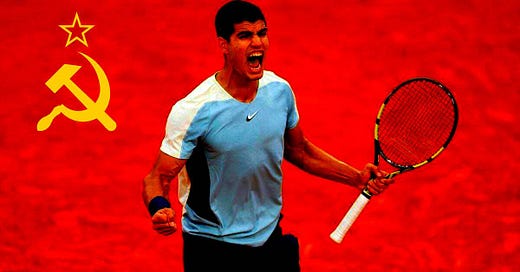On the Alcaraz Question
A friendly exchange between comrades on the revolutionary prospects of Carlos Alcaraz Garfia
Many in the leftist tennis community were stunned on Tuesday when emerging Spanish tennis worker Carlos Alcaraz Garfia was defeated by the reactionary Alexander Zverev in the quarterfinals of the French Open. In light of this setback for what many on the left have termed the “Alcaraz Revolutionary Strategy”, two members of Club Leftist Tennis sat down to discuss where we go from here.
Because of the dangerous nature of revolutionary work, the names of these comrades have been redacted.
Comrade A: Despite this recent loss, I count myself among those who are optimistic about the prospects of Alcaraz representing a challenge to the established capitalist “Big Three” order (now weakened to only two truly active players). Even the bourgeois media has recognized the raw power of his game and has expressed fear that he may achieve what leftist players have aspired to fruitlessly for decades, a grand slam victory against the capitalist system.
Comrade B: While I can’t deny his raw ability, I will point out that his power game is augmented by cheap tricks like his signature drop shot, a showy but ultimately insufficient strategy, not unlike left liberal groups such as Extinction Rebellion, or failed revolutionaries of other sports such as the Harlem Globetrotters.
A: But this particular historical development of the game amongst young players is not unique to Alcaraz. Using dialectical materialism, we can start to identify a great diversity of tactics emerging. The rise of the underhand serve for instance, once considered a cheap parlor trick of the ruling class, is now a key tactic in the arsenal of leftist militants. Alcaraz’s all court game, while still in the infancy of its development much like Russia on the eve of 1917, shows potential in countering the hegemonic aggressive baseline style.
B: Well, then we arrive at the crux of this debate: if his praxis is so powerful, why hasn’t he sparked revolution? Is not the old world of the Big Three dying, and a new, socialist one ready to be born?
A: The Alcaraz uprising may not have blossomed into revolution *yet* but this rupture in the established order of domination has exacerbated the contradictions among the top of the tour, no doubt laying important groundwork for the next upswell from those locked out of grand slam glory.
B: I’m skeptical of the possibility of revolution stemming from the leadership of a single charismatic player without having the party infrastructure of rank and file young rising players equally developed to fully supplant the vestiges of the established order. The Big Three oligarchs will never be overthrown until they are completely locked out of the quarter finals at every grand slam, something Alcaraz can’t do alone.
A: Of course, but that’s why it’s so exciting to see Alcaraz not as a lone savior, but as a member of a vanguard who has happened to make material gains in the science of revolution against the Big Three. More young players should be studying his success dialectically and applying the results to their strategies, instead being rigid and dogmatic.
B: But what happens when a cult of personality becomes a substitute for building durable working class institutions? I truly hope that Alcaraz doesn’t become a sort of reformist figurehead as his gains are repurposed into the development of a state capitalist era of tennis.
A: Agreed. The Alcaraz moment has arrived like a weak lob and now the working class must smash it into a winner. Young insurgent players like Sinner, Auger-Aliassime, Korda and Rune must fight to build a cross-tendency coalition, or else potentially lose this moment forever.
B: One thing is for sure—like Alcaraz’s drop shot, the revolution will come from below.





